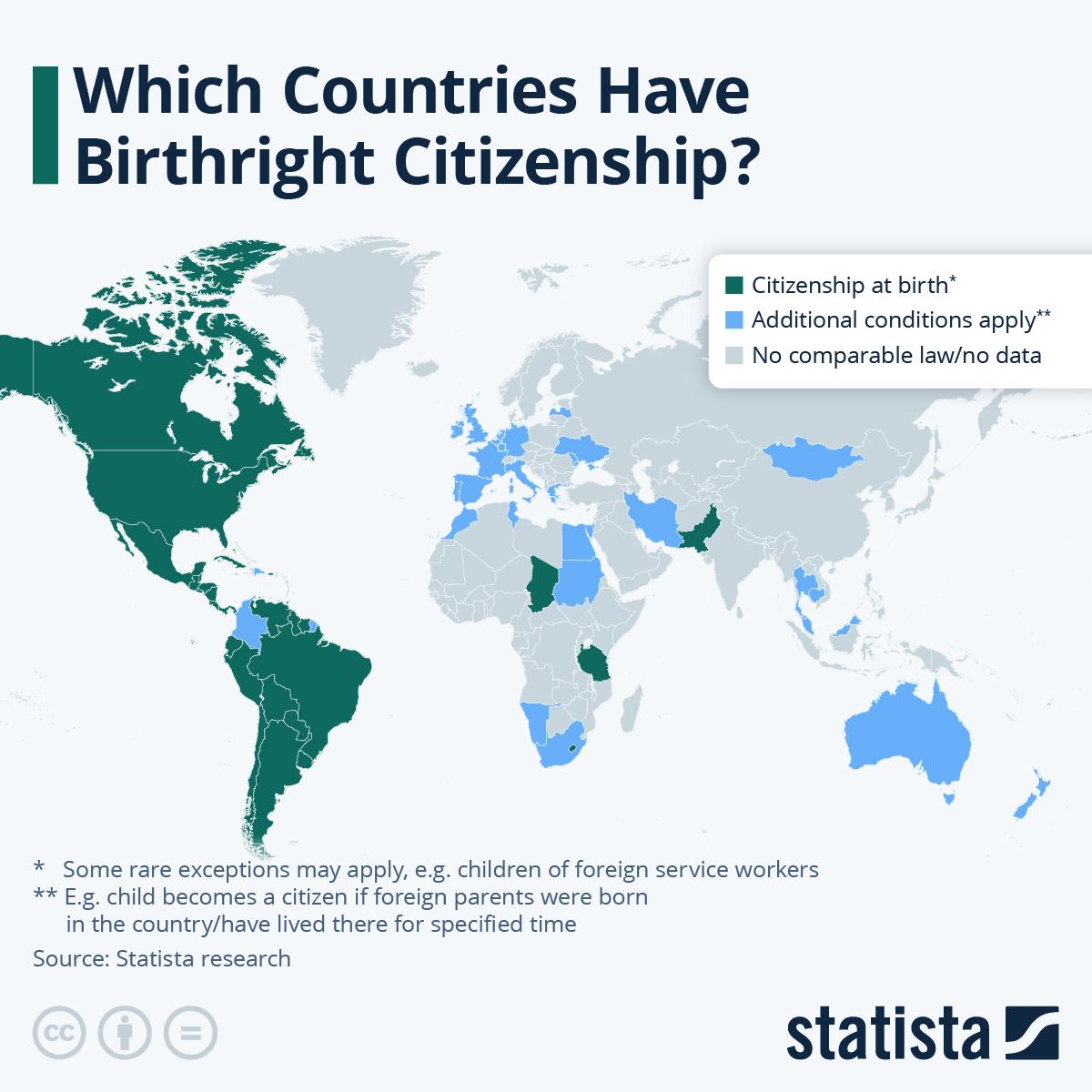Birthright Citizenship Countries Map


Marcus Rodriguez
Historical Geography Expert
Marcus Rodriguez specializes in historical cartography and geographic data analysis. With a background in both history and geography, he brings unique...
Geographic Analysis
What This Map Shows
This map provides a visual representation of countries that grant birthright citizenship, a policy that automatically confers citizenship to individuals born within a nation's territory, regardless of their parents' nationality. This concept, known as jus soli (right of the soil), varies significantly from country to country. In some nations, being born on the land guarantees citizenship, while in others, citizenship is derived from the nationality of one's parents (jus sanguinis or right of blood). Understanding where birthright citizenship is recognized can shed light on global migration patterns, demographic shifts, and national policies regarding citizenship.
Deep Dive into Birthright Citizenship
Birthright citizenship is a fundamental principle in many countries, influencing not only the lives of individuals but also the socio-political landscape of nations. The practice has historical roots, particularly in the United States, where the 14th Amendment enshrines the right to citizenship for anyone born on U.S. soil. However, this has been a contentious issue, especially amid ongoing debates about immigration and national identity.
Interestingly, there are approximately 30 countries worldwide that still maintain some form of birthright citizenship. These include notable examples such as Canada, the United States, and several countries in Latin America, where the policy has been a means of promoting inclusivity and diversity. For instance, Canada’s commitment to multiculturalism is reflected in its citizenship policies, which encourage immigrants to settle and integrate into society.
A fascinating aspect of birthright citizenship is its implications for migration. Countries that offer this right often attract individuals seeking better economic opportunities, education, or safety. For example, in the U.S., the prospect of citizenship for a child born on American soil can be a powerful incentive for families considering immigration. According to a report from the Pew Research Center, around 4 million children in the U.S. are born to undocumented immigrants, showcasing the intersection of immigration and citizenship laws.
However, the landscape is changing. Some nations, like the United Kingdom and Australia, have moved away from unconditional birthright citizenship in recent years, placing restrictions on the practice as a response to growing concerns about immigration control and national identity. As a result, the number of children who can automatically claim citizenship upon birth has decreased in these regions, creating a more complex legal landscape for new parents.
Regional Analysis
When examining the map of countries with birthright citizenship, it becomes evident that the practice is predominantly found in the Americas and certain parts of Africa. In South America, countries such as Brazil, Argentina, and Chile uphold jus soli, allowing for automatic citizenship to anyone born within their borders. The rationale often stems from historical contexts where nations sought to populate and develop their territories.
In contrast, Europe exhibits a mixed approach. While countries like Ireland maintain birthright citizenship, many others, such as Germany and France, have adopted a more restrictive stance, favoring descent-based citizenship. This variation reflects differing national priorities and attitudes toward immigration. For example, Germany's approach has evolved to address its changing demographics, focusing on integrating immigrants into the society rather than granting automatic citizenship.
Africa presents an intriguing case as well. Nations such as South Africa and Kenya have adopted jus soli principles, recognizing the importance of citizenship in fostering social cohesion. However, the implementation can be inconsistent, with some individuals facing bureaucratic hurdles despite being born in the country.
Significance and Impact
Understanding birthright citizenship is essential for grasping contemporary global issues related to migration, national identity, and human rights. The concept not only affects individuals but also has broader implications for social policies, integration practices, and demographic trends. With the rise of global migration, countries that maintain birthright citizenship may continue to experience shifts in population dynamics, economic contributions, and cultural diversity.
As we look toward the future, the debate surrounding birthright citizenship is likely to intensify. With increasing globalization, nations may need to reevaluate their citizenship laws to balance national interests with the humane treatment of individuals seeking a better life. The map of countries with birthright citizenship serves as a vital tool for understanding these complex dynamics, revealing how different regions approach the fundamental question of who belongs.
Ultimately, the discussion around birthright citizenship is not just about nationality—it's about identity, belonging, and the evolving nature of citizenship in an interconnected world. Ever wondered how these policies might shape future generations? The implications are profound, and as migration patterns shift, so too will the policies that govern citizenship around the globe.
Visualization Details
- Published
- October 9, 2025
- Views
- 14
Comments
Loading comments...